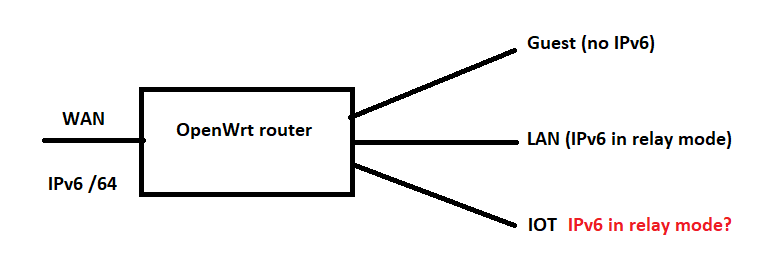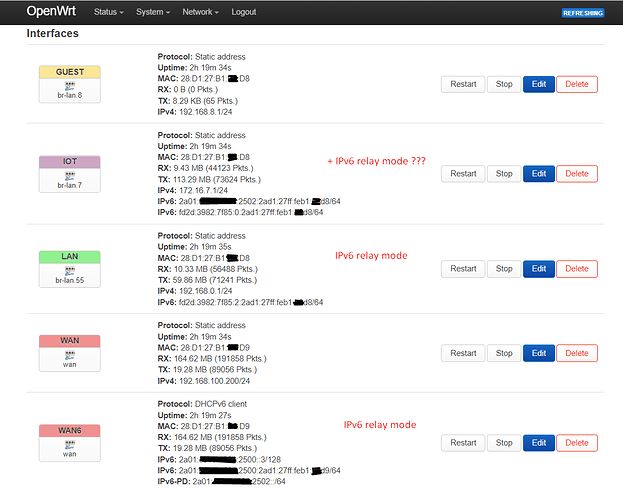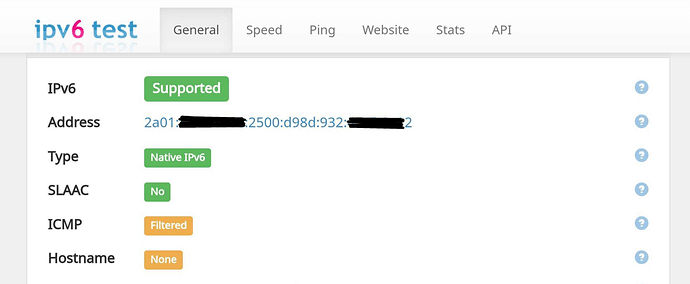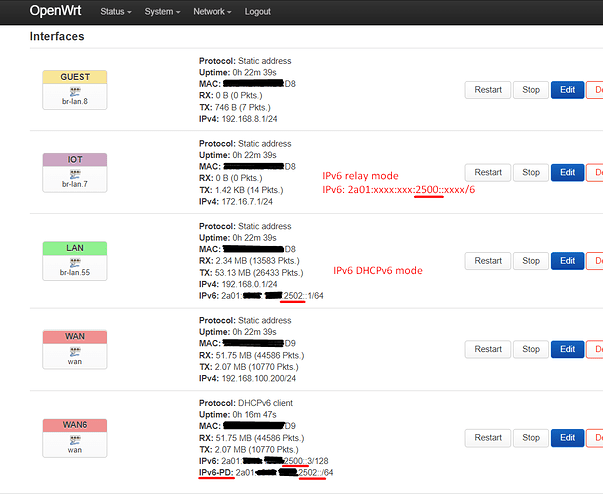Hi everyone!
I have 3 VLANs in my home network: LAN, IOT and Guest.
I'm getting only /64 ipv6 prefix from my ISP into WAN port of OpenWrt router, and while I'm waiting for an answer from my IPS, I'm using IPv6 relay mode solution.
My questions below are addressed to the more experienced OpenWrt users here:
- should I avoid IPv6 relay mode configuration for several VLANs interfaces if I get only /64 on WAN?
expand: Relay single /64 IPv6 into several VLANs configuration
config dhcp 'wan6'
option interface 'wan6'
option master '1'
option ra 'relay'
option dhcpv6 'relay'
option ndp 'relay'
...
config dhcp 'lan'
option interface 'lan'
option ra 'relay'
option dhcpv6 'relay'
option ndp 'relay'
...
config dhcp 'IOT'
option interface 'IOT'
option ra 'relay'
option dhcpv6 'relay'
option ndp 'relay'
...
- If should avoid, then why? (I really don't have any problem with this configuration at the moment, and am only concerned about possible security and reliability issues with this config).
Thanks.
Details of my test setup can be found here
Because "LAN" vlan is my main network, the IPv6 relay is enabled for LAN only.
Everything works fine, I'm getting ipv6 into main VLAN ("LAN"): I can reach out to any ipv6 resources, https://ipv6-test.com/ says that IPv6 connectivity is available, so everything is fine.
But 1 week ago I've enabled IPv6 relay mode for second vlan "IOT' (so in general, I have got the IPv6 relay enabled on both interfaces: vlan1 "LAN" and vlan2 "IOT")... and ipv6 has started perfectly working on both of them. ![]()
ubus call system board;
ip6tables-save -c; ifstatus wan6
route
root@OpenWrt:~# ubus call system board;
{
"kernel": "5.10.134",
"hostname": "OpenWrt",
"system": "MediaTek MT7621 ver:1 eco:3",
"model": "Xiaomi Mi Router 4A Gigabit Edition",
"board_name": "xiaomi,mi-router-4a-gigabit",
"rootfs_type": "squashfs",
"release": {
"distribution": "OpenWrt",
"version": "22.03.0-rc6",
"revision": "r19590-042d558536",
"target": "ramips/mt7621",
"description": "OpenWrt 22.03.0-rc6 r19590-042d558536"
}
}
root@OpenWrt:~# ip6tables-save -c; ifstatus wan6
-ash: ip6tables-save: not found
{
"up": true,
"pending": false,
"available": true,
"autostart": true,
"dynamic": false,
"uptime": 9628,
"l3_device": "wan",
"proto": "dhcpv6",
"device": "wan",
"metric": 0,
"dns_metric": 0,
"delegation": true,
"ipv4-address": [
],
"ipv6-address": [
{
"address": "2a01:xxxx:xxxx:2500::3",
"mask": 128,
"preferred": 6573,
"valid": 10173
},
{
"address": "2a01:xxxx:xxxx:2500:2ad1:27ff:feb1:xxd9",
"mask": 64,
"preferred": 10660,
"valid": 14260
}
],
"ipv6-prefix": [
{
"address": "2a01:xxxx:xxxx:2502::",
"mask": 64,
"preferred": 6573,
"valid": 10173,
"class": "wan6",
"assigned": {
"IOT": {
"address": "2a01:xxxx:xxxx:2502::",
"mask": 64
}
}
}
],
"ipv6-prefix-assignment": [
],
"route": [
{
"target": "2a01:xxxx:xxxx:2500::",
"mask": 64,
"nexthop": "::",
"metric": 256,
"valid": 14260,
"source": "::/0"
},
{
"target": "::",
"mask": 0,
"nexthop": "fe80::1",
"metric": 512,
"valid": 1660,
"source": "2a01:xxxx:xxxx:2500:2ad1:27ff:feb1:xxd9/64"
},
{
"target": "::",
"mask": 0,
"nexthop": "fe80::1",
"metric": 512,
"valid": 1660,
"source": "2a01:xxxx:xxxx:2502::/64"
},
{
"target": "::",
"mask": 0,
"nexthop": "fe80::1",
"metric": 512,
"valid": 1660,
"source": "2a01:xxxx:xxxx:2500::3/128"
}
],
"dns-server": [
"2606:4700:4700::1113",
"2606:4700:4700::1003"
],
"dns-search": [
],
"neighbors": [
],
"inactive": {
"ipv4-address": [
],
"ipv6-address": [
],
"route": [
],
"dns-server": [
],
"dns-search": [
],
"neighbors": [
]
},
"data": {
"passthru": "001700202606470047000000000000000000111326064700470000000000000000001003"
}
}




